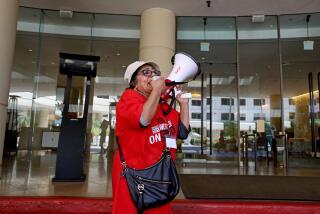TOP STORIES -- Jan. 23-28
- Share via
AT&T; May Be Bought by Baby Bell SBC
SBC Communications Inc., one of the so-called Baby Bells spawned from AT&T; Corp.’s 1984 breakup, is in talks to buy its former parent, according to people familiar with the negotiations. A deal could be announced as early as Monday.
Even if the acquisition attempt falters, though, AT&T;’s days as a stand-alone firm may be numbered -- the company falling victim to new technologies, changing regulations and bad bets its executives made about the future of telecommunications. The storied Bedminster, N.J., company has stumbled for more than a decade.
FCC Chairman Michael K. Powell, reached in Davos, Switzerland, told Bloomberg News that the SBC-AT&T; talks were “part of a growing recognition that the communications market is really converging.”
No price in the SBC talks was disclosed, but the markets valued AT&T; at $14.8 billion, based on Thursday’s stock price.
*
U.S. Economic Growth Slows to 3.1% Rate
U.S. economic growth, hobbled by lower demand for American goods and services overseas, sagged to an annual rate of 3.1% in the final three months of last year, the government reported.
It was the lowest growth rate since the first three months of 2003, the Commerce Department said.
But for all of 2004, gross domestic product -- the broadest measure of the nation’s economic output -- grew by 4.4%. That was its highest rate since the 4.5% registered in 1999, shortly before the most recent recession.
Economists attributed the tail-off in the final three months of 2004 to a 3.9% decline in exports, the sharpest drop in two years. Imports grew 9.1% as the U.S. continued to suck in goods from around the world, particularly China and Japan.
*
P&G; to Buy Gillette in $53-Billion Deal
Procter & Gamble Co. agreed to acquire razor and battery maker Gillette Co. for $53 billion. The deal would create the world’s largest consumer-products firm.
If approved by regulators, the deal would bring together Gillette’s , Duracell batteries, Right Guard deodorant and razor brands and P&G;’s Tide detergent, Clairol hair products and Folgers coffee. The combined company would have more than $60 billion in annual revenue.
P&G; would pay 0.975 share for each Gillette share. Based on P&G;’s closing price of $55.32 Thursday, the deal values Boston-based Gillette at $54 a share, an 18% premium over its $45.85 closing price.
Gillette Chairman Jim Kilts would become P&G;’s vice chairman. The company would remain headquartered in Cincinnati. P&G; executives expect the deal to close sometime this fall.
*
Music Label Chief Faces Laundering Charges
The Justice Department has accused music producer Irv “Gotti” Lorenzo and his brother Christopher of laundering drug money for Kenneth “ ‘Preme” McGriff, charged separately with the murders of three men.
Prosecutors allege that the Lorenzo brothers and McGriff funneled about $1 million through various ventures, including Murder Inc., which has since tried to soften its image by renaming itself The Inc.
A 37-page indictment portrays the Lorenzos, McGriff and five others as members of a criminal enterprise that furthered its activities by “intimidating and threatening to use physical violence against others to dissuade them from cooperating with law enforcement.”
Gotti and his brother were released on $1-million bonds after pleading not guilty in federal court in Brooklyn.
The Inc. is co-owned by Universal Music Group’s Island Def Jam Records, which hasn’t been charged with any wrongdoing.
*
L.A. Hotels to Face Labor Agency Complaint
The National Labor Relations Board’s top attorney has found that nine upscale Los Angeles-area hotels acted illegally in declaring an impasse in July in their talks with the hotel workers’ union, according to union and hotel officials.
The general counsel’s decision to issue a complaint could be a strategic and financial blow to the hotels, said an NLRB official who spoke anonymously.
Richard McCracken, attorney for Unite Here, which represents the hotel workers, said the complaint could give the union certain advantages, including the ability to call a strike without risking permanent job losses.
Fred Muir, a spokesman for the Los Angeles Hotel Employer’s Council, said that the council could appeal to an administrative law judge and, eventually, to the entire NLRB board in a process that could take years. The hotels also have the option of negotiating a settlement with the NLRB.
*
Yahoo Signs Lease for Space in Santa Monica
Yahoo Inc., making good on its bid to become a force in the entertainment business, has agreed to lease part of a Santa Monica office complex for as much as $100 million in one of the largest commercial real estate deals in Los Angeles County in the last year.
The Sunnyvale, Calif.-based company will lease as much as 256,000 square feet in Colorado Center -- soon to be known as Yahoo Center -- for 10 years. The complex is owned by Chicago-based Equity Office Properties.
Yahoo’s headquarters will remain in Northern California. Yahoo’s newly formed media group, headed by former ABC television network Chairman Lloyd Braun, will be based in Yahoo Center.
That will allow executives to rub elbows with Hollywood deal makers without the hassle of flying in from Northern California.
A Yahoo spokeswoman declined to discuss lease details.
Real estate experts estimate that the company will have enough room for about 1,000 employees at the complex.
*
PUC Votes to Shelve Telecom ‘Bill of Rights’
California regulators voted to shelve the first set of consumer protection rules in the nation to cover both conventional and cellular phones, handing a victory to carriers that had complained bitterly about them.
Consumer advocates said the California Public Utilities Commission’s 3-1 vote effectively killed the so-called telecommunications bill of rights.
The rules, which were adopted by the commission May 27 and technically took effect Dec. 6, spelled out 15 requirements aimed at protecting people from deceptive marketing and billing.
PUC Commissioner Susan P. Kennedy said the vote didn’t doom the rules but only postponed their ultimate implementation. Indeed, the measure on which the commission voted included language stating that the PUC would decide by the end of the year when the rules would again go into effect.
*
Google’s New Hire Fuels Browser Speculation
Google Inc. has hired the chief engineer of the fast-growing Firefox Web browser, fueling speculation that the online search giant may challenge Microsoft Corp.’s dominant Internet Explorer.
Until earlier this month, Ben Goodger worked for the nonprofit Mozilla Foundation, which is leading the Firefox effort and other campaigns to develop software written by large volunteer collectives.
Goodger’s duties at Google weren’t disclosed. But the 24-year-old wrote on his blog that he would work on Firefox and “Web browsing in general.” A Google spokesman said Goodger would spend half his time on Mozilla Foundation projects.
*
Amgen Profit Rises 26% but Slowdown Expected
Amgen Inc. said its profit grew 26% for the fourth quarter on strong sales of cancer-related products but warned that the pace would slow in 2005.
The Thousand Oaks biotechnology company’s net income was $689 million, or 53 cents a share, up from $547 million, or 41 cents, a year earlier. Excluding acquisition-related expenses and other charges, profit was $749 million, or 58 cents. Revenue rose 24% to $2.9 billion.
Results missed analysts’ forecast by 3 cents a share, according to Thomson First Call. Chief Executive Kevin Sharer said Amgen met its own estimates.
Amgen expects revenue growth in 2005 to be in the high single digits to low teens. It said adjusted per-share profit would be $2.70 to $2.85, representing a growth rate of 13% to 19%. The forecast doesn’t include costs of expensing stock options.
*
Hurt by Flu-Shot Woes, Chiron Reports Loss
Chiron Corp. posted a fourth-quarter loss of $22.9 million, clobbered by the suspension of flu vaccine sales in October.
The company posted a loss of 12 cents a share, contrasted with a profit of $121.8 million, or 61 cents a share, a year earlier. Revenue fell 23% to $428.6 million from $554.6 million.
Excluding special items, the loss would have been 4 cents a share. Analysts surveyed by Thomson First Call had expected 10 cents.
The Emeryville, Calf., company’s flu vaccine operations were suspended in October by British regulators. Related expenses totaled $15 million, including $11 million in legal costs.
Chief Executive Howard Pien said he expected Food and Drug Administration approval of a medicine for lung transplant patients in the third quarter.
*
For a preview of this week’s business news, please see Monday’s Business section.
More to Read
Inside the business of entertainment
The Wide Shot brings you news, analysis and insights on everything from streaming wars to production — and what it all means for the future.
You may occasionally receive promotional content from the Los Angeles Times.










